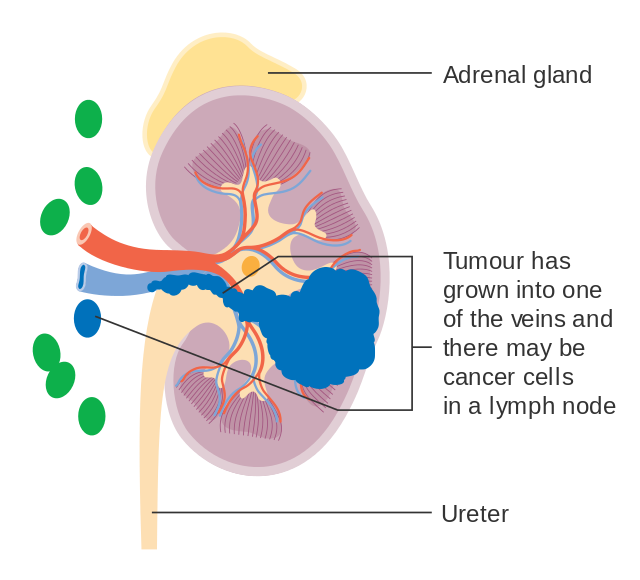Stage 3 Kidney Cancer is when the cancer has spread from the kidney into nearby veins or lymph nodes.
Stage 3 Kidney Cancer survival rate is 75-79% (NIH) but varies by individual so start learning about Stage 3 Kidney Cancer today and partner with your doctors to make the best treatment choice for you.
Kidney Cancer Stage 2 ICD 10 is C64.1.
Tap “Watch Now” for an easy-to-understand overview of Stage 3 Kidney Cancer.
- Stage 3 Kidney Cancer
Overview
Stage 3 Kidney Cancer diagnosis means that the cancer is any size and:
1. Has spread to a nearby lymph nodes shown here in blue surrounded by green nodes,
or
2. The tumor has spread to your blood vessels in or near the kidney, called renal vein and vena cava, to the structures within your kidney that collect urine, or into the layer of fatty tissue around the kidney, shown in pink.
What Tests Will I Need and Why?
Urine, Blood and Imaging tests are done to understand your general health, confirm your diagnosis and determine your cancer stage.
A test called a biopsy is also typically done. This test looks at sample cells taken from your tumor to help identify your specific cancer cell type, critical to finding the best treatment option for you.
If your treatment team has not already performed tests to determine your cancer’s features, please ask your doctor when these tests will be performed.
Re-read this summary as needed and then tap, “Compare My Treatment Options Now“. Our unique Comparison Page will help you understand your FDA-approved treatment options including, who can help you pay for your treatment, where and how each is given and what side-effects you may experience.

Cancer Research U.K. CC BY-SA 4
Recommended Kidney Cancer Videos

Kidney Cancer
An Introduction

How Cancer Spreads
Metastatic = Advanced

Diagnosing Your Cancer
How Does a CT Scan Work?

Diagnosing Your Cancer
How Does a PET Scan Work?

Exercise! You Can Do It
Reducing Side Effects & More
Commonly Searched Questions
Stage 3 Kidney Cancer Treatment
Stage 3 Kidney Cancer treatment usually involves surgery to remove the tumor, embolization, or clinical trials. Now click here to Compare Your Latest Treatment Options.
Source: Cancer.org
Stage 3 Kidney Cancer Survival Rate
According to SEER data, Stage 3 kidney cancer has a survival rate of 72.3%. For example, if the 5-year relative survival rate for a specific stage of kidney cancer is 72.3%, it means that patients who have that cancer are, on average, about 72.3% as likely as patients who don’t have that cancer to live for at least 5 years after being diagnosed.
Source: Cancer.gov
Stage 3 Kidney Cancer Recurrence Rate
The overall prognosis for stage 3 kidney cancer shows an excellent outcome of 72.3% for the 5-year survival rate, but 30% of the patients still experience recurrence.
Source: Cancernetwork.com
Stage 3 Kidney Cancer Symptoms
Early kidney cancers usually do not cause any signs or symptoms. As the tumor grows larger, symptoms may appear. You may have one or more of these kidney cancer symptoms:
- Blood in your urine
- A lump in your side or abdomen
- A loss of appetite
- A pain in your side that doesn’t go away
- Weight loss that occurs for no known reason
- Fever that lasts for weeks and isn’t caused by a cold or other infection
Source: Cancer.org
Stage 3 Kidney Cancer Prevention
While specific prevention for Stage 3 kidney cancer is not applicable since it is an advanced stage, general strategies to reduce the risk of developing kidney cancer include:
- Maintain a Healthy Weight: Obesity is a risk factor for kidney cancer.
- Quit Smoking: Smoking increases the risk of kidney cancer.
- Manage High Blood Pressure: Control hypertension to lower cancer risk.
- Eat a Balanced Diet: Focus on fruits, vegetables, and whole grains, and limit red and processed meats.
- Exercise Regularly: Engage in physical activity to support overall health.
- Limit Exposure to Harmful Chemicals: Use protective measures if exposed to industrial chemicals linked to cancer risk.
These lifestyle choices can help reduce the overall risk of kidney cancer and aid in its early detection. For personalized advice, consult with a healthcare provider.
Source: Cancer.org
Stage 3 Kidney Cancer Definition
Stage 3 kidney cancer is characterized by cancer that has extended beyond the kidney into nearby areas or lymph nodes but has not metastasized to distant organs. In this stage, the tumor may have invaded major veins such as the renal vein or the surrounding tissues, including the adrenal gland or the fat surrounding the kidney. Additionally, the cancer might have spread to nearby lymph nodes. Despite this local advancement, Stage 3 kidney cancer has not yet spread to distant parts of the body. This stage indicates a more advanced progression than earlier stages, with a higher likelihood of local spread but without distant metastasis.
Source: Cancer.gov





